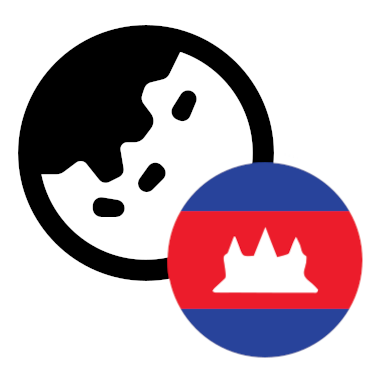Justice and reconciliation in Cambodia
The aftermath of the Khmer Rouge has continued to emotion- ally devastate Cambodians for almost forty years. Brutal torture, sexual violence against women, starvation and mass killings occurred from 1975 to 1979, and resulted in the death of 21 percent of Cambodia’s population, or 1.7 million people. Several high-level Khmer Rouge war criminals have been on trial in the Khmer Rouge Tribunal since 2010, which has already resulted in one guilty verdict.
To strengthen the reconciliation and the peace-building process, the Civil Peace Service (CPS) ensures that Cambodian citizens and Khmer Rouge survivors are thoroughly informed about Tribunal processes to foster public opinions about the outcomes. It is hoped that understanding, and a feeling of citizen ownership of the legal process will result in a genuine sense of justice.
Cambodian civil society and government institutions in partner- ship with CPS carry out outreach and education about the Khmer Rouge Tribunal. Since 2007, several civic groups and the Victims Support Section of the Tribunal have implemented outreach programs in all provinces of the country.
In public forums, representatives from the Tribunal respond to questions from the people. These events are aired on the radio, thereby addressing an even wider audience, as survivors call in to share their thoughts and experiences. As a result, two movies have been produced addressing forced marriages during the Khmer Rouge regime and truth telling.
A lasting and powerful educational legacy for future Cambodian generations will tell the story of survivors of the Khmers Rouge. These stories reach other Cambodian women, men, young people and children through a wide range of engaging outreach materials.
Please click here for more information.
 Ã‚
Data Protection – Disclaimer
Â
Â
Symposium on “Working with Families in Cambodia” at RUPP
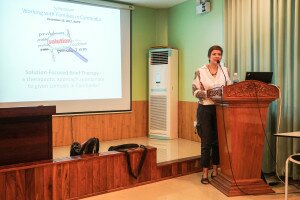 19 December 2017
19 December 2017
The Department of Psychology invited professionals from the field of Mental Health to exchange experience and learn from each other during presentations of projects on working with families and clinical application of family therapy from various organizations in Cambodia and international family therapists on December 15 at the Royal University of Phnom Penh (RUPP). Fourth year Bachelor psychology students were listening amongst the audience of psychologists, social workers and project officers to presentations like “Family Dialogue” or “Intergenerational Dialogue”Â, both addressing the past traumatic experience in Families during the KR. Further topics were “Alternative Care for Children in the Community”, and case presentations from graduates of the DP’s recent training in Family and Systemic Practice. The audience was actively involved with interesting questions and insightful comments. The event was organized by the team of the Master program in “Clinical and Counseling Psychology” together with CPS advisor Bernhild Pfautsch and financially support by the CPS/GIZ.
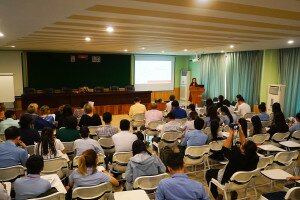
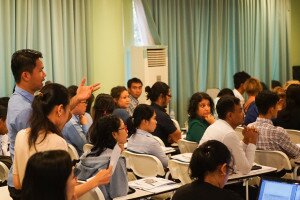
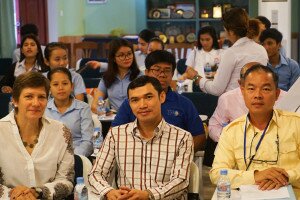
Please find more info about the master program here: http://masterofpsychology-rupp.com/
Disclaimer
Data Protection Ã‚ Ã‚laimer
„Good Mental Health brings Peace“
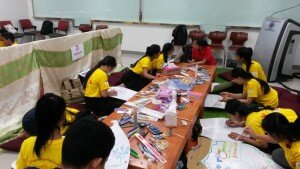 27 October 2017
27 October 2017
One could see this slogan on many yellow T-shirts last Tuesday on Campus of the Royal University of Phnom Penh at the “Youth Mental Health Day”. The Department of Psychology, with financial support by the GIZ Civil Peace Service, organized this annual awareness rising event for the fifth time and more than 1700 students, lecturers and mental health professionals were following the invitation. Beside the booths of the 15 participating organizations displaying information on their work, several activities were offered like yoga, mini-counseling and art therapy. New highlights this year were six expert talks held in the big assembling hall, covering various topics like “Contemporary youth, social media and mental health” or “Most common substances use in Cambodia and its consequences” and have met an interested audience.
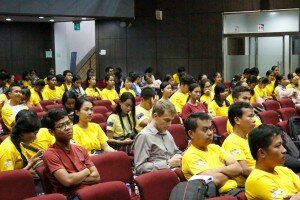
Data Protection
Data Protection
Disclaimer
Presentation of the study „Positive Youth Development”
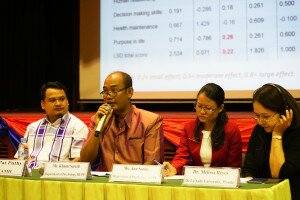 15 September 2017
15 September 2017
The Department of Psychology at RUPP has been conducting a survey on “Positive Youth Development” (founded by CPS/GIZ), comprising 1600 young people from six different high schools in urban and rural areas. The focus of this study was to explore the influence of the school environment as well as certain features of the family on the young people well-being and future aspirations. On Wednesday, 13th of September the findings were presented to a professional audience by faculty of the DP and the Principal Investigator Dr. Lopez Reyes (De La Salle University, Manila) during a forum at the RUPP campus. The around 100 participants were also listening with great interest to the various impulse speeches from practitioners in the field of school counseling and family therapy.
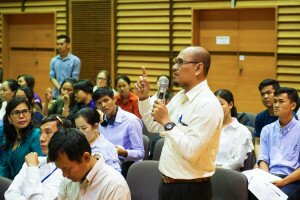
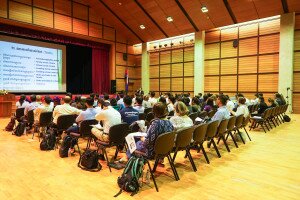
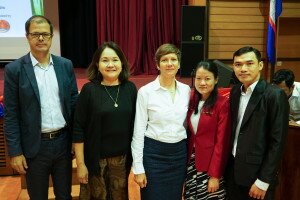
Data Protection
Data Protection
Disclaimer
German students meet the Civil Peace Service/GIZ in Cambodia
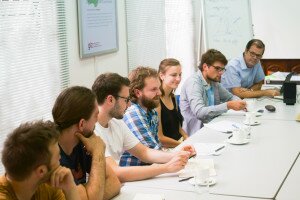 09 August 2017
09 August 2017
Peace and conflict studies and law students from the University of Marburg visited the Civil Peace Service (CPS) program office of GIZ in Phnom Penh.
CPS advisors and the program coordinator provided them with first-hand information working with Cambodian partner organizations in the field of Transitional Justice in the context of the Khmer Rouge Tribunal. Furthermore, practical insights into the work of the advisors were given to the students through visits to CPS partner organizations such as the Tuol Sleng Museum, the Department of Psychology at the Royal University and the Transcultural Psychosocial Organization (TPO).
xxxxxxx
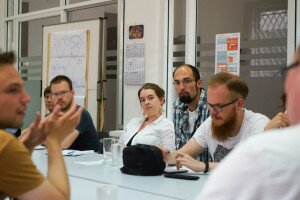

xxxx
xxxx
xxxx
xxxx
xxxx
xxxx
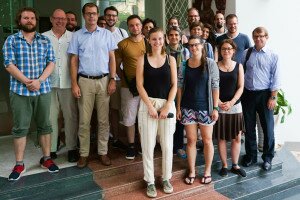
Data Protection
Disclaimer
“Training on Counseling and Psycho-Social Interventions for substance abusing clients”
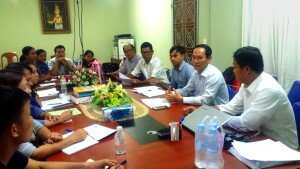 26 July 2017
26 July 2017
The Department of Psychology (DP) at the Royal University of Phnom Penh and the Department of Mental Health and Substance Abuse (DMHSA) at the Khmer Soviet Friendship Hospital opened a new chapter of collaboration this week.
A10-week training for psychiatric staff (psychiatrists, psychiatric nurses, and nurses) at the hospital will equip the 12 participants in order to address the need for suitable services for drug users particularly on providing evident-based psychological interventions. Dr Ean Nil, a Clinical Psychologist and lecturer from the DP, has been working on the development of the training manual to deliver a tailored training for the present situation in Cambodia. He will conduct the training at the hospital with assistance from students of the DP’s Master Program in “Clinical and Counseling Psychology”.
Students of this program will benefit from the collaboration as they will get the opportunity clinical internships at the clinic. The training is funded by GIZ’s Civil Peace Service program as a part of its long term collaboration with the Department of Psychology.
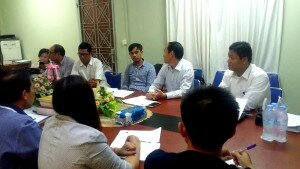
Data Protection
Disclaimer
Future Family Therapists started training at Department of Psychology RUPP
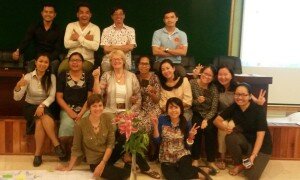 27 April 2017
27 April 2017
Experienced psychologists and social workers know about the importance of the family in Cambodia as a collectivist society. For the “Postgraduate Certificate in Family Therapy and Systemic Practice” training of the Department of Psychology at RUPP enrolled 12 of them – working in various fields of their professions. Comprehensive therapy training courses are scarce in Cambodia, and the existing trainings address mainly individuals with their therapeutic approach. Development advisor Bernhild Pfautsch, working with the GIZ-Civil peace service at the University, has set up a curriculum to meet the needs for further vocational training of graduates and practitioners. She conducts the 5-module training as well as supportive supervision sessions together with Anna Huisman, a Dutch Family Therapist based in Phnom Penh.
Family therapy as a systemic approach considers the network of significant relationships of which each individual is a part of. It explores the beliefs that give meaning to people’s behavior and the patterns of interaction and communication between people from families and different systems. The course will provide a significant opportunity for interdisciplinary learning by gathering a group of experienced professionals who bring profound proficiency from their field.
The project will get prominent support from Prof. Dr. John K. Miller, now based at Fudan University Shanghai, China, and former member of the Board of Directors of the American Association for Marriage and Family Therapy (AAMFT), who will teach the second module in June.
As the course structure fosters the immediate implementation of new knowledge in workplace-based cases the 12 trainees were already discussing on the last day of their first training module how to use the new therapeutic techniques with their current clients.
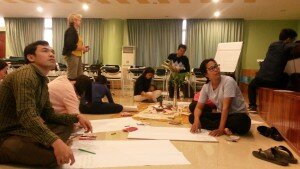
Disclaimer
Two finalists of “A Time to Remember – Songwriting Contest” performed in Siem Reap
 07 March 2017
07 March 2017
On February 24th winner Phoch Sreyrath and finalist Sidet Shophady of the – Civil Peace Service Program of Deutsche Gesellschaft für Internationale Zusammenarbeit (GIZ) GmbH supported – song contest were on stage at the “Chubmet festival” in Siem Reap, to present two remembrance Songs, created as from young artists to the surviving generation of Khmer Rouge.
The Song Contest and final concert celebrated in December 2016 in Phnom Penh had attracted 400 young and old mixed audience (https://www.facebook.com/Remembrance2016/?fref=ts). The project is part of the dealing with the past and peace education program of the Youth Resource Development Program (YRDP), one of the Civil Peace Service partner organizations in Cambodia.
The social media campaign flanked contest has attracted thousands of youth to reflect on Khmer Rouge History and opened up the opportunity to participate in Cambodia’s process of reconciliation, by writing and composing songs of remembrance to the surviving generation. The project applies at the Extraordinary Chambers in the Courts of Cambodia (ECCC) to become a reparation in Case 002/02. 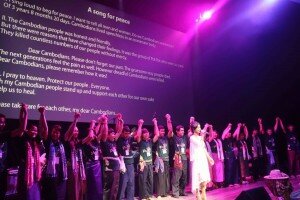
An important element of the project is to promote remembrance songs nationwide and across Cambodian borders. For this, the concert has been live broadcasted on radio, the songs have been studio recorded and the winner is now on tour. After Siem Reap in February the next tour stop will be Myanmar, where Sreyrath will perform her song to a young audience.
The recorded songs will be distributed and further promoted to be part of events, educational programs to inspire youth to seek for integrational dialogue, reflecting on the past and advocating among generations to take active part in Cambodia’s process of reconciliation.
Data Protection
Disclaimer
Dealing with the past: Engaging in the present
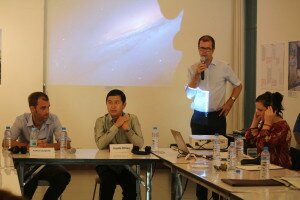 17 February 2017
17 February 2017
The Civil Peace Service (CPS) program of Deutsche Gesellschaft für Internationale Zusammenarbeit (GIZ) GmbH co-funded a one-week conference on “Dealing with the past: Engaging in the present”. The conference was organized by the Heinrich Böll Foundation, Cambodia and supported by One Earth Future.
The concept for the event was conceived over the course of 2016 in order to engage international post-conflict professionals, providing a space for meaningful exchange on topics related to issues that transcend borders. The thematic design of the program facilitates organized engagement with relevant topics each day: Space; Justice; Prevention; Healing; Memory. Activities were organized around these themes in order to provide structure to the programming for the program participants and for those engaged in public programming. Participants included professionals engaged in various post-conflict work in Cambodia and abroad. The group took part in the week-long curriculum including a visit to S21 Tuol Sleng Genocide Museum, the Khmer Rouge Tribunal, and the Killing Fields, during which they met with experts and spokespeople of the sites.
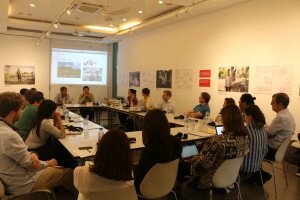
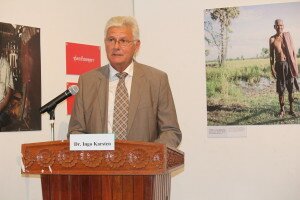
Participants had the opportunity to attend theatre plays on forced marriage under the Khmer Rouge and civil courage, view films on related topics, and engage in discussions, facilitating a space for networking and meaningful exchange. Public programming facilitated by the participants included panels, debates, and discussions at Meta House on the following topics:
- The Role of Museums and Institutions in Genocide Education
- Can there be appropriate justice after genocide?
- Women, Peace and Security in the Context of Genocide Prevention
- Healing the Trauma
- Hate Speech and the Global Peace Index
- Why did they participate?
- Dealing with the Legacy of the Holocaust
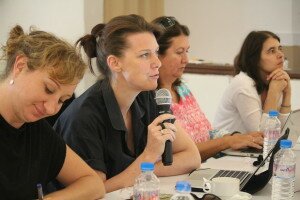
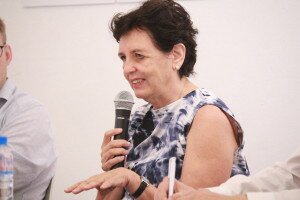
For more information please go to:
https://kh.boell.org/en/2017/02/06/personal-reflections-conference-dealing-past-engaging-present
From „Like Ghost Changes Body“ to „Phka Sla Krom Angkar“
 17 February 2017
17 February 2017
In 2014 the Civil Peace Service (CPS) partner organization “Transcultural Psychosocial Organization” (TPO) conducted a study called “Like ghost changes body” – A study on the Impact of Forced Marriage under the Khmer Rouge Regime. After 2 and half years of planning, fund raising and rehearsals a consortium of NGOs, including Khmer Arts Academy, Kdei Karuna, TPO and Bophana Audiovisual Resource Center created a classical dance drama and a mobile exhibition based on oral histories of survivors of forced marriage. The performance and exhibition took place at Chaktomuk Theater on the 20-22 of January 2017. The project was planned with the support and consultation of Civil Parties, Civil Party Lead Co-Lawyers and the Victims Support Section of the ECCC. Civil Parties and dancers receive psychosocial support during the ongoing project, while documentation is continuously realized by the Bophana Center.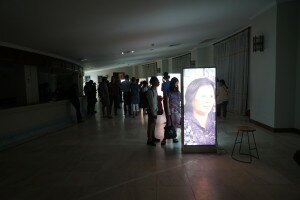
The CPS program promoted the civil party mechanism at the ECCC from the beginning with financial support and with technical advice. This support is focusing on gender based violence (GBV) under the Khmer Rouge (KR).“Phka Sla Krom Angkar is the only proposed judicial reparations project that addresses the harm suffered by men and women as a result of forced marriages, and it aims to help make the ECCC’s historic hearings on sexual and gender based violence (GBV) under the Khmer Rouge (KR) regime accessible to communities.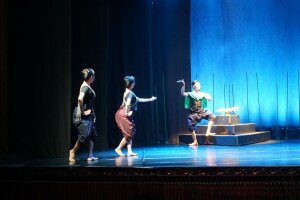
It further intends to foster a transformation in the understanding of GBV and gender equity by addressing the many impacts of forced marriages under the KR and to share this part of Cambodian history with the next generation” (Source of quotation: Brochure on the occasion of the Phka Sla dance drama performance, 20-22 January 2017 in Chaktomuk Hall)
This project is financed by the German Federal Ministry of Economic Cooperation and Development (BMZ), the Swiss Agency for Development and Cooperation (SDC) and USAID.
The Civil Peace Service of GIZ in Cambodia supports the “Forum on the Developments of ECCC’s Proceedings and Reparations in Case 002/02”
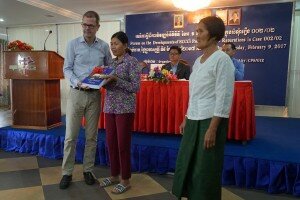 16 February 2017
16 February 2017
On Thursday, 9 February 2017, the Victims Support Section of the ECCC in cooperation with the Civil Party Lead Co-Lawyers organised a forum on the developments of the ECCC’s proceedings and reparations in Case 002/02.
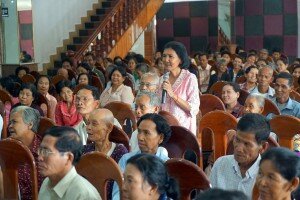 More than 150 survivors of the Khmer Rouge regime participated in the event, and received detailed information about the current Case 002/02 and the Appeal Judgment in Case 002/01 against Nuon Chea and Khieu Samphan. As a symbolic acknowledgement of their meaningful contribution to the proceedings, the published Appeal Judgment was handed over to the Civil Parties in a small ceremony.
More than 150 survivors of the Khmer Rouge regime participated in the event, and received detailed information about the current Case 002/02 and the Appeal Judgment in Case 002/01 against Nuon Chea and Khieu Samphan. As a symbolic acknowledgement of their meaningful contribution to the proceedings, the published Appeal Judgment was handed over to the Civil Parties in a small ceremony.
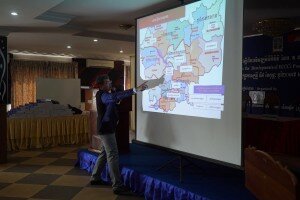 Furthermore, the participants exchanged information about the thirty-five reparation projects currently implemented or planned under the reparations mandate of the ECCC which aim at acknowledging the sufferings of Civil Parties and to help to restore their dignity and wellbeing.
Furthermore, the participants exchanged information about the thirty-five reparation projects currently implemented or planned under the reparations mandate of the ECCC which aim at acknowledging the sufferings of Civil Parties and to help to restore their dignity and wellbeing.
The Civil Peace Service supports the activities of the Victims Support Section of the ECCC to ensure that victims of the Khmer Rouge regime can receive justice and redress through meaningful participation as Civil Parties in the judicial proceedings before the ECCC.
Voices of Ethnic Minorities
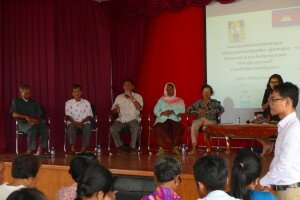
Discussion between ethnic civil parties and Khmer students.
01 December 2016
The Civil Peace Service (CPS) partner organization “Kdei Karuna” launched their exhibition Voices of Ethnic Minorities in Phnom Penh on 20 November 2016. The exhibition documents the persecution and suffering of Muslim Cham and ethnic Vietnamese during the Khmer Rouge regime from 1975 to 1979. With funding of the CPS of GIZ, Kdei Karuna has collected oral history accounts of ethnic minorities. Telling the history through a combination of personal stories and well selected historical information, around 40 university students were invited to learn how the Khmer Rouge rigidly suppressed Muslim religious practices and traditions, killing those who would not give up their belief. Other exhibits recounted the killing of ethnic Vietnamese spouses who refused to leave their Khmer families and be deported to Vietnam along with around 170.000 ethnic Vietnamese who had been living in Cambodia for several generations. The exhibition utilized interactive exhibits to involve the spectators, offered visual and acoustic documents as well as space for reflection and feedback.
After the visit to the exhibition, 16 survivors of Cham, Vietnamese and Khmer ethnicity shared their experiences and answered the questions of the students. In order to link injustice and grievances from the past to present-day issues of exclusion and discrimination, students were then invited to reflect on their views of Cham and ethnic Vietnamese in Cambodian society today. By engaging Khmer youth to deal with the past of their parents’ generation, Kdei Karuna strives to contribute to a more peaceful and socially and culturally inclusive Cambodia.
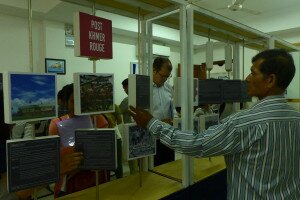
Historical timeline.
The majority of the ethnic Khmer Rouge survivors attending the exhibition launch have been recognized as civil parties in case 002/02 at the Extraordinary Chambers in the Courts of Cambodia (ECCC) in which charges of genocide against Cham and ethnic Vietnamese have been heard. Voices of Ethnic Minorities – Promoting public awareness about the treatment of ethnic minorities during the Khmer Rouge Regime has been submitted as a reparation project to the ECCC. The exhibition will tour Cambodia in 2017 and engage local youth, civil parties and Khmer community members in dialogue forums.
Book Presentation “The ECCC – Assessing their contribution to International Criminal Law”
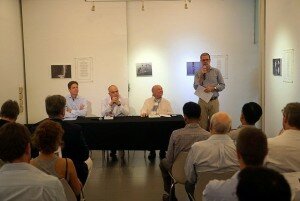
Speakers from left to right Meisenberg, Koumjian, Stanton, Smith.
28 October 2016
On October 19th, 2016, a first comprehensive book on the work and functioning of the Extraordinary Chambers in the Courts of Cambodia (ECCC) was presented at META House, at an event hosted by the Civil Peace Service program of GIZ Cambodia. The book presentation began with an introduction by Mr. Nicholas Koumjian, Co-Prosecutor at ECCC and was followed by Mr. Simon Meisenberg, a former CIM/GIZ Advisor to the trial chamber at the ECCC, who is the co-editor of the book. Dr. Ignaz Stegmiller, the second co-editor (was not present) was a former CPS advisor working in the field of ECCC legacy. A keynote lecture was delivered by Prof. Dr. Gregory Stanton, President Genocide Watch and Research Professor in Genocide Studies and Prevention on: Reflections on the ECCC.
The book entails an analysis of the work and jurisprudence of the ECCC, providing a detailed assessment of their legacies and contribution to international criminal law. The collection, containing 20 chapters from leading scholars and practitioners with inside knowledge of the ECCC, discusses the most pressing topics and its implications for international criminal law.
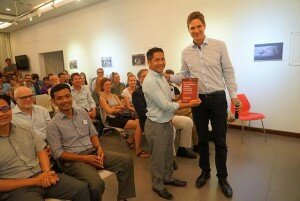
Handover of a copy of a book to the the ECCC Library.
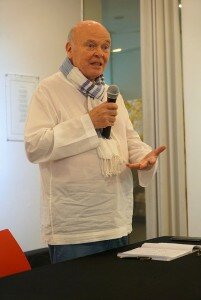
Prof. Dr. Gregory H. Stanton.
Full house at the Royal University
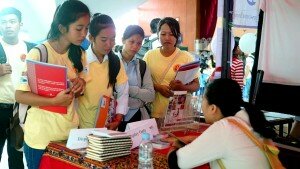 19 October 2016
19 October 2016
Already for the fourth time interested students and mental health professionals gathered for the “Youth Mental Health Day” on October 14th at the Royal University’s amazing assembly hall. The event was organized by the Department of Psychology with financial support from the German Ministry of Economic Cooperation and Development (BMZ) through the Civil Peace Service of GIZ.
The staff of 16 participating NGOs could already exchange ideas during preparatory meetings and hence networking was also one of the main targets of this major event, to foster connections between different governmental and non-governmental institutions.
Furthermore, the organizers aimed to introduce and to promote Clinical Psychology and Psychiatry within the wide field of „Mental Health”. More than 1900 visitors came and gathered information at the different booths and took part in activities like Mini-Counseling, Mindfulness Exercises or Yoga.
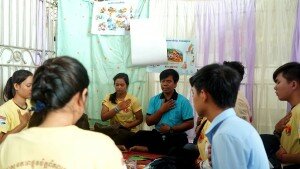
During the last two hours of the event short expert talks were organized focusing various treatment methods and their application in Cambodia. The four different presenters came from psychological and psychiatric backgrounds and were available for questions from the interested young audience.
The Department of Psychology considers this dialog between both professions to be an important step towards the acknowledgement of Clinical Psychology in Cambodia.
Bernhild Pfautsch
CPS/GIZ development advisor – Department of Psychology Royal University of Phnom Penh
Legal Identity and Inclusive Development in Cambodia
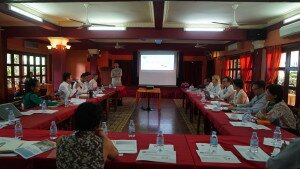 23 September 2016
23 September 2016
The Minority Rights Organization (MIRO) organised a roundtable of key stakeholders to initiate a discussion about how to engage with sustainable development goal (SDG) 16.9 on legal identity in Cambodia on September 13, 2016. The focus was on vulnerable, marginalized and hard-to-reach populations, especially minority groups. While SDG 16.9 carries a promise of inclusion by making the invisible legally visible, insisting on legal identity requirements for accessing rights and services could have the unintended effect of further excluding the most marginalized as these groups may face serious obstacles in obtaining legal identity. Against this background, the roundtable with around 20 participants from local NGOs, UN agencies and development partners provided a venue to consider SDG 16.9 in the context of Cambodia, including identifying gaps, especially in relation to minority groups, and discussing strategies to reduce barriers to a legal identity.
The SDGs aim under goal 16.9 “by 2030 provide legal identity for all including birth registration”. When adopting the SDGs in September 2015, the UN General Assembly acknowledged that means to prove legal identity are a global development issue and thus linked to development opportunities and outcomes. Suggestions for indicators on legal identity currently focus on birth registration. Lack of birth registration creates a particularly high risk of statelessness for specific groups, including minority groups, and often inhibits children to gain access to public education and other services.
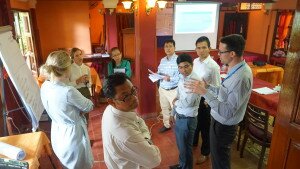 The Royal Government of Cambodia has undertaken reforms in the past years that are of relevance to SDG 16.9, including the creation of a General Department of Identification within the Ministry of Interior. It has adopted a National Strategic Plan of Identification (2017-2026), which has the long-term vision “every person is to have an identity”. Roundtable participants proposed a number of recommendations for how to consider marginalized populations and minorities in these initiatives, including enhancing cooperation between the government and civil society, more coordinated data-gathering and data-sharing to get a clearer picture about left-behind populations and the gaps and barriers relating to SDG 16.9, as well as more targeted outreach and awareness-raising strategies that consider the specific circumstances of marginalized groups.
The Royal Government of Cambodia has undertaken reforms in the past years that are of relevance to SDG 16.9, including the creation of a General Department of Identification within the Ministry of Interior. It has adopted a National Strategic Plan of Identification (2017-2026), which has the long-term vision “every person is to have an identity”. Roundtable participants proposed a number of recommendations for how to consider marginalized populations and minorities in these initiatives, including enhancing cooperation between the government and civil society, more coordinated data-gathering and data-sharing to get a clearer picture about left-behind populations and the gaps and barriers relating to SDG 16.9, as well as more targeted outreach and awareness-raising strategies that consider the specific circumstances of marginalized groups.
The roundtable was funded by the German Federal Ministry of Economic Cooperation and Development (BMZ) by way of the Civil Peace Service (CPS) of GIZ in Cambodia. The CPS program aims at promoting conflict-sensitive (re-) integration of long-term minority populations, including the ethnic Vietnamese minority communities, strengthening social cohesion and reducing the risk of violent conflict.
Theater can be more than fun!
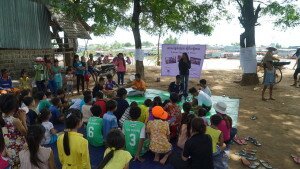
Actors mime a brawl between young Khmer and Vietnamese men
14 September 2016
The Civil Peace Service (CPS) partner organization Khmer Community Development (KCD) runs a program that makes use of theater as a tool to transform conflict between interethnic groups in a commune inhabited by Khmer and ethnic Vietnamese in Kandal province. Applying the methodological approach of Forum Theater, which developed out of Augusto Boal’s Theater of the Oppressed, KCD particularly invites the young generation to develop their own ideas on how to find peaceful solutions to problems that arise on a day-to-day basis in an ethnically mixed commune.
On 28 August 2016, KCD conducted a Forum Theater session in Khnar Tang Yu Village. When Khmer actors with painted faces got on the improvised stage to mime a brawl between young Khmer and Vietnamese men – acting non-verbally in order to overcome language barriers – they were greeted by the giggles and laughter of up to 40 children of the ethnic Vietnamese community aged 10 to 14. But KCD junior staff, mostly originating from ethnically mixed families in the same commune, were well-prepared to catch the attention of the youngsters and draw them to the issue at hand: What would you do to change the course of the story? The children suggested that the bar owner and the police should intervene, and then they watched the actors improvise the scene with a new, non-violent outcome. One boy called for ethnic groups to live together harmoniously. The serious expression on his face seemed to indicate that he had given the issue quite some thought already.
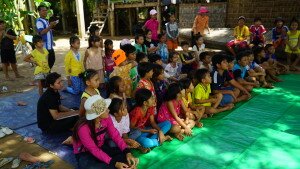
Vietnamese children are engaged in discussing alternative solutions to interethnic conflict
Then it was the turn of the children to think of their own experiences of conflicts between communities. Some of the children came to the stage and played Vietnamese characters having a conflict with Khmer authorities. Again the children discussed possible solutions and came up with ideas how to solve the problem in a peaceful and legal way.
By actively engaging the audience, Forum Theater is a creative approach to playfully encourage reflection on alternative outcomes to well-known problems and then trying them out in a protected environment.
Since 2014, the CPS has been supporting a number of local organizations that work on the integration of ethnic Vietnamese who have lived in Cambodia for several generations. Many were expelled by the Khmer Rouge in 1975 and experience social and economic exclusion since their return during the 1980s. The CPS program contributes to comprehensive peace-building in Cambodia which needs to include marginalized groups and minorities, and promotes their access to development opportunities, community empowerment and conflict transformation.
For further information see www.kcd-ngo.org
+++++
Khmer Rouge Tribunal Turns to Forced Marriage
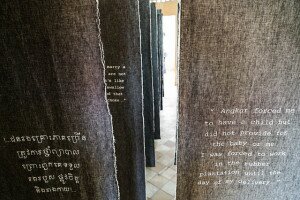
Exhibition on Forced Marriage under the Khmer Rouge
25 August 2016
GIZ Cambodia celebrates that victims of the widespread practice of forced marriage perpetrated by the Khmer Rouge are telling their stories in public hearings for the first time at the Extraordinary Chambers in the Courts of Cambodia (ECCC).
Through the Civil Peace Service program, GIZ Cambodia has been working since more than eight years with governmental and non-governmental organizations to seek justice for victims of forced marriage and/or sexual violence committed by the Khmer Rouge regime.
Due to the continuous efforts and advocacy by Civil Party lawyers of the Civil Peace Service program, the current Case 002 of the ECCC includes in its indictment the crime of forced marriage and the rapes that occurred in the context of those marriages. Furthermore, the Civil Peace Service has been supporting women’s hearings since 2012 giving victims of gender-based violence and forced marriage under the Khmer Rouge a public platform to talk about their experiences.
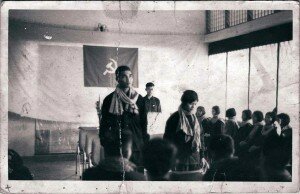
Forced marriage under the Khmer Rouge regime
In cooperation with the Civil Peace Service program, the GIZ Cambodia’s Access to Justice for Women program worked closely with the Cambodian Ministry of Women’s Affairs to break-up the silence of the Cambodian Government about sexual violence and forced marriage. As a result, the issue was effectively integrated into two Cambodian national policies, namely the Fourth National Strategic Plan for Gender Equality (2014-2018), known as Neary Rattanak IV, and the Second National Action Plan to Prevent Violence against Women (2014-2018).
The long-standing and continuous work of GIZ Cambodia and its Civil Peace Service program to support civil conflict transformation and promote reconciliation and justice in the context of the Khmer Rouge Tribunal has been repeatedly featured by international, German and Cambodian media.
Authors: Ms. Ursula Sticker and Mr. Rodrigo Montero Cano
For more information please contact Mr. Marc Smith, coordinator of the Civil Peace Service program, at
Youth Community Dialogue about Khmer Rouge past
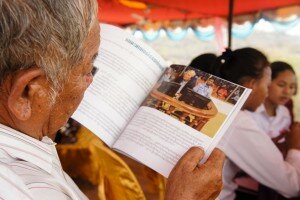 26 May 2016
26 May 2016
On April 28th, 2016, Kdei Karuna (KdK) – a partner organization of CPS – implemented a Youth Community Dialogue at Phnom Trung Bat crime site in Kralanh district, Siem Reap province, giving survivors of the Khmer Rouge crime site and local high school students the unique opportunity to speak about the past. Approximately 80 persons participated in the fruitful dialogue event where survivors shared their experiences from the past, addressing the history of the crime site and their home community. KdK staff developed a forum theatre play together with students focusing on the topic of forced marriage and forced labor, and, after its presentation, conducted a lively discussion among the survivors and students on how to prevent similar crimes from happening in the future.
One of the survivors appealed to the students: “Please, you should believe what your parents and grand-parents tell you about their experiences from the past. Their stories are true!”
A 13-year-old student expressed his feelings: “I feel angry when I hear all the misery that happened during the Khmer Rouge regime, but I will not hate nor seek for revenge. I will study hard and commit myself to peace and unity for my country“.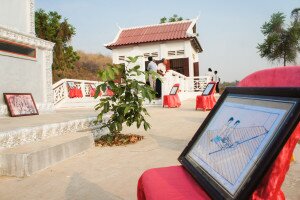
The dialogue event concluded with the screening of a documentary film about the Khmer Rouge times, followed by a feedback and reflection round.
The Youth Community Dialogue is part of KdK’s community-led Community Memory Initiative. It promotes restorative justice and local memory initiatives in order to enable Cambodians and especially Cambodian youth in more rural areas to better understand the Khmer Rouge past. It seeks to overcome social rifts that remain as a legacy of decades of conflict at the community level by fostering mutual understanding and historical dialogue.
For more information, please visit KdK on Facebook https://www.facebook.com/kdeikaruna/?fref=ts or at www.kdei-karuna.org.
Testimonial Ceremony of TPO
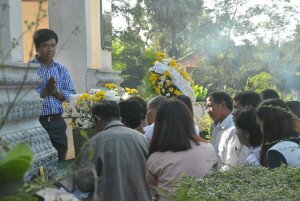 19 November 2015
19 November 2015
On November 13, 2015, during Testimonial Ceremony of TPO, Khmer Rouge survivors were invited to process their traumatic experiences with a trained counselor during a series of confidential sessions.
Testimonial Therapy (TT) is a short-term treatment for psychological trauma that was specifically develped to improve the coping ability of survivors as well as reduce their posttraumatic stress symtoms after experiencing torture and other forms of organized political violence. The Transcultural Psychosocial Organization Cambodia (TPO) has adopted TT by integrating traditional and religious practices led by Buddhist monks in local pagodas, which in turn, reinforce the power and significance of traditional coping and healing in the country’s spirit-based culture.
TPO, in cooperation with the victoms Support Section of the ECCC (Extraordinary Chambers in the Courts of Cambodia) aims to improve access to legal and psychological services for Civil Parties which is generously funded by GIZ (Gesellschaft für Internationale Zusammenarbeit) and SF (Swiss Foundation).”
Signing ceremony for Memorial at Tuol Sleng Genocide Museum
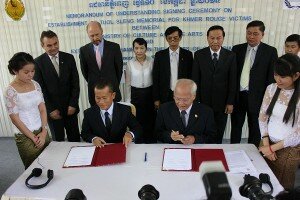 10 July 2014
10 July 2014
German Ambassador Joachim Baron von Marschall and GIZ Country Director Mr. Adelbert Eberhardt witness the signing of the Memorandum of Understanding by H.E. Chuch Poeurn, Secretary of State of the Ministry of Culture and Fine Arts, and H.E. Kranh Tony, Acting Director of the office of Administration of Extraordinary Chambers in the Courts of Cambodia (ECCC) on the establishment of a memorial for Khmer Rouge victims at the Tuol Sleng Genocide Museum, Phnom Penh, on 10 July 2014.
The funds for this memorial have been provided by the German Ministry for Economic Cooperation and Development (BMZ) through German Organization for International Cooperation (GIZ) as part of the German support for the ECCC Reparation Program 2013-2017, an extensive program of eleven reparation projects and five non-judicial measure projects for the benefit of the victims of the Khmer Rouge which is coordinated by the Victims Support Section of the ECCC.
Please follow the link below for the speech of the German Ambassador Joachim Baron von Marschall:
http://www.phnom-penh.diplo.de/Vertretung/phnompenh/en/00__start/Unterzeichnung_20MoU_20-_20Bo_20Rede.html
Stakeholders Consultation on Reparations for Victims of Khmer Rouge
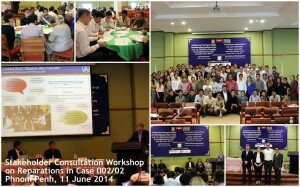 11 June 2014
11 June 2014
A successful Stakeholders Consultation on Case 002/02 Reparations: Lessons Learned, Best Practices & Next Steps, presided over by H.E. Tony KRANH, Acting Director of the Administration Office of the Extraordinary Chamber in the Courts of Cambodia (ECCC), was conducted on 11 June 2014 in Phnom Penh.
In preparation for the next trial, Case 002/02 which is about to start End of July 2014, the Victims Support Section and the Lead Co-Lawyers Section of the ECCC consulted with civil party lawyers and representatives of civil society organizations, victims associations, state authorities, and donors to identify and discuss potential reparation requests for the benefit of victims of the Khmer Rouge regime. A wide variety of criminal charges will be included in this next trial, including the genocide of ethnic minorities, forced marriages and rape, and internal purges. Accordingly, the Victims Support Section and Lead Co-Lawyers Section are seeking to develop a diverse range of reparation projects that will address the specific harms suffered as a consequence of the crimes charged, and bring redress to civil parties.
Voices of Participants:
“I am very satisfied with the Stakeholders Consultation, which provided an opportunity to discuss projects that will benefit civil parties of Case 002/02. I wish to make an appeal to national and international donors to please make a donation to our requested reparation projects.”
Mr. CHUM Mey
Civil Party in Case 002 and President of Ksem Ksan Victims Association
++
“I think that this was an excellent opportunity for stakeholders to sit together and discuss the issue of reparations in Case 002/02 for the interest of the civil parties. It was a meaningful and dynamic consultation between the participants and organizers, who collaborated to formulate reparation projects and to request financial support from potential donors.”
Mr. Peou Dara VANTHAN
Deputy Director, Documentation Center of Cambodia
+++++++
CPS Partners Launch First Website on Gender-Based Violence under the Khmer Rouge Regime
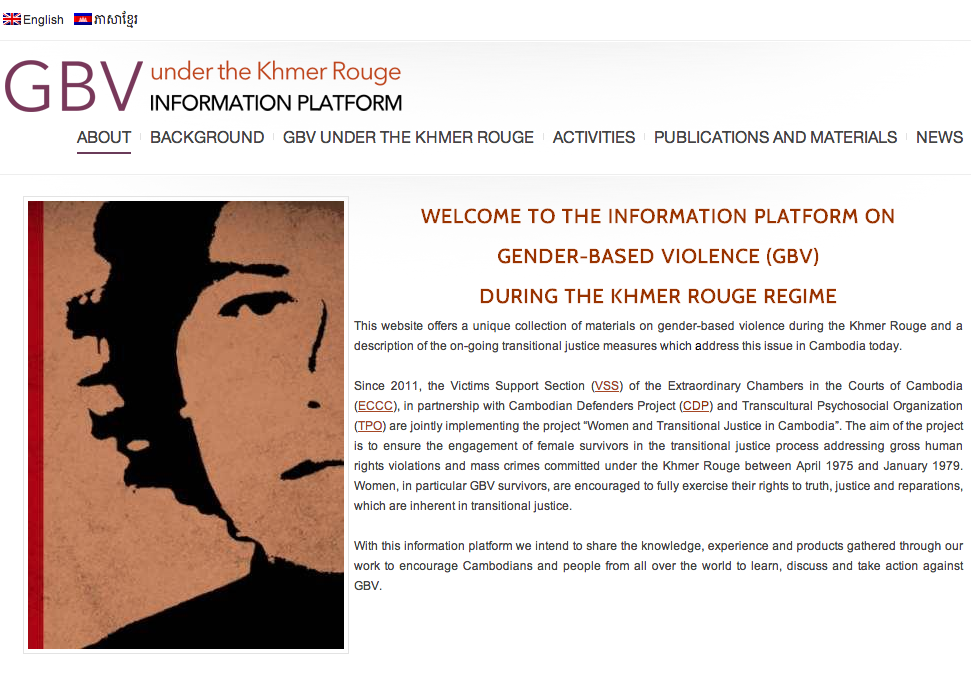
The mass crimes committed under the Khmer Rouge in Cambodia in the period of 1975 to 1979 are known to many. Less known is the fact that apart from torture, murder and forced labor, gender-based violence in particular against women was also committed. Even among the Cambodian population the myth of the puritan Khmer Rouge soldier who obeys a code of conduct prohibiting so-called “immoral offenses” against women is prevalent. Such a myth reinforces the taboo on rape and other crimes against women who are thus excluded from the transitional justice process.
In order to thwart this myth and to give victims a voice in the historic record, three GIZ CPS partners in Cambodia have created www.gbvkr.org. This website contains a unique collection of documents, publications, articles, background information and video/audio-material on this topic which mainly originates from the work of the CPS Partners: Victims Support Section (VSS) at the Khmer Rouge Tribunal, Cambodian Defenders Project (CDP) und Transcultural Psyschosocial Organisation (TPO). These three organisations have joined forces to advance the participation of women in the transitional justice process through outreach activities, legal and psychological support and attendance at the Khmer Rouge Tribunal.
Information on violence against women in the Khmer Rouge period is rare and scattered. By setting up this website VSS, CDP and TPO are accomplishing pioneer work in the field of transitional justice in Cambodia in the hope that in future these silenced crimes will be acknowledged and condemned to the same extent as other crimes against humanity.
Dealing with the past
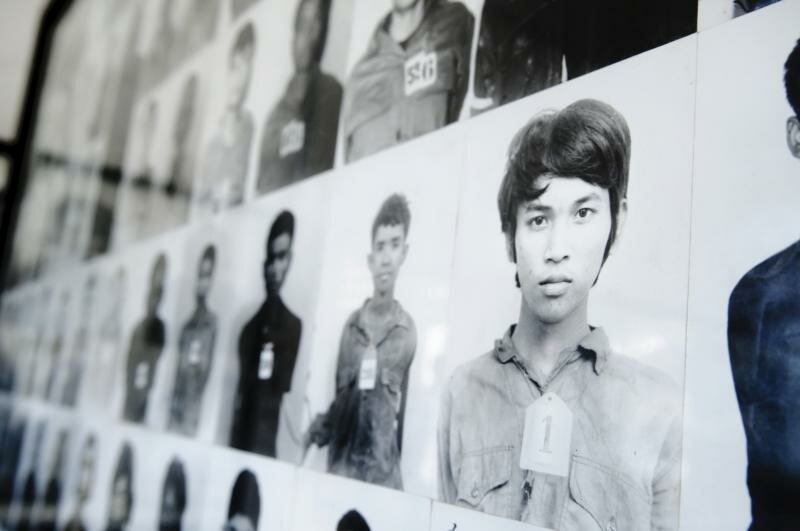
15 May 2013
Today’s young Cambodians did not experience the Khmer Rouge’s reign of terror. Nonetheless, their generation is affected by the traumas of the past, which deeply mark Cambodian society.
Sun Py was nine years old when he was separated from his parents and three siblings in 1976. He survived the horrors of the Khmer Rouge regime but suffered considerable distress as a result of losing his family and not knowing what had become of them. Thirty-four years later, Sun Py found those he had lost with the help of a TV programme. Cameras recorded the reunion, capturing the moment when he embraced his mother for the first time and broke down in tears. A year later Sun Py was interviewed by Ly You Y and Lay Rattana for their documentary film “Finding Lost Ones”. He told them: “I feel very happy, both physically and mentally.” He added: “I know my identity.” His mother, who had thought her son dead, described her relief: “I feel like I have recovered from all my illness.” One of the two film-makers who shot the documentary about Sun Py and others, Ly You Y, is 22 years old. That is the average age of the Cambodian population. Like more than 60% of her compatriots, she did not directly experience the Pol Pot dictatorship from 1975 to 1979. Even so, she was affected by it in a deeply personal way: “My mother lost three of her six brothers and sisters during that time,” the young woman explains. Ly You Y made her film in 2011 as part of her studies in the Department of Media and Communication (DMC) at the Royal University of Phnom Penh. The project was supported by the Civil Peace Service (CPS) of GIZ. However, the film-maker had less luck than her main character. Her relatives are still missing: “We did everything we could to find them. But now we have no hope anymore.” They remain among the hundreds of thousands of people who disappeared without trace. For the TV programme “It’s not a Dream”, which reunited Sun Py with his family, Cambodian broadcaster Bayon reported receiving at least 20 missing persons enquiries a day.
Years of terror
Most people search in vain. An estimated 1.7 million fell victim to the Khmer Rouge. That was approximately a fifth of the population at the time. Men, women and children lost their lives in the “Killing Fields” or on death marches. Others starved or died as forced labourers, succumbing to untreated diseases or wounds inflicted by torture. Children witnessed their parents’ execution, wives and husbands saw their partners turned into murderers. Everyone fought for their own survival, humanity disappeared from society. Every family in Cambodia was affected by the genocide – as victims, perpetrators or in many cases both. Anyone who disobeyed orders paid with their own life. Many who became murderers thus see themselves as victims, forced to commit crimes against their will. The consequences are feelings of guilt and shame – and a widespread inability to talk about personal experiences. Even many Khmer Rouge lost family members. Under Pol Pot, Cambodians suffered a collective trauma that was even passed down to later generations. “Traumatised parents are often unable to offer guidance to their children,” explains trauma counsellor Heidrun Ziegler, who worked as a Civil Peace Service (CPS) expert in Cambodia from 2002 until 2006. “Even if adults in a child’s immediate social environment can control their emotions, that child will sense the pressure they are under. In some cases, a child may even develop the same symptoms as its deeply traumatised mother, but it cannot explain where they come from.”
Psychological problems
In the 2012 Cambodian Mental Health Survey conducted by the Royal University of Phnom Penh’s Department of Psychology with GIZ financial support, more than 30 % of women and nearly 20 % of men complained of anxiety disorders. 20 % of women and 10 % of men suffered from bouts of depression. Symptoms associated with post-traumatic stress disorder (PTSD) were reported by three percent of the women and 1.6 % of the men in the sample. The suicide rate in Cambodia is the highest in Southeast Asia. Psychologists at the university are currently working on a youth distress screener, an instrument to identify stress factors among young people. The methodology needs to be tuned to the culture. “The questions we ask to ascertain psychological disorders in a Western survey are not necessarily right for Cambodia,” explains Swiss team member Elizabeth Högger-Klaus. In 2008, the university introduced a master’s programme in psychology, which is now being revised to focus on family therapy. “As the so-called second post-Khmer Rouge generation, children and young people are an important target group and we want to accommodate them by looking at the whole system in which they live: family, friends and school,” says Högger-Klaus. She points out that psychological disorders are not due only to the reign of terror. Poverty, domestic violence and impunity have also played an important role. She sees the problem as one of more than just collective trauma; the cultural and religious context matters too (see side-bar link “Background information). The fact that the country today is ruled by former Khmer Rouge is another obstacle to dealing with the past. They are ministers, provincial governors and village chiefs. Even Prime Minister Hun Sen is ex-Khmer Rouge and shows no interest in revisiting the past. But Hun Sen could not indefinitely oppose the trial proceedings demanded for decades by the international community. After long negotiations with the United Nations, the Khmer Rouge Tribunal started work in 2006. Presided over by both Cambodian and international judges, the special court is tasked with bringing the most responsible members of the Khmer Rouge to account. However, many victims are disappointed in the court because it has so far convicted only one perpetrator. Nevertheless, the court has made the past a public issue. National and international media report on the trials, thousands of victims have been involved in the proceedings. Civil-society organisations grasped the opportunity of campaigning in the context of the tribunal.
Village work
Kdei Karuna is one such initiative. The CPS partner organisation operates a “Justice and History Outreach Program” designed to promote communication about the past in villages and communities – also between parents and children. Workshops are staged to identify community-specific needs and requirements and local moderators are trained in conflict management and dialogue facilitation to support the relevant processes. Sometimes village elders get together with young people and relate their experiences under the Khmer Rouge. Sometimes they express experiences in artworks – which then help them talk about what happened – or the subject is introduced by a film on the experiences of survivors. According to Tim Minea, the Cambodian sociologist who leads Kdei Karuna, the communication initiated in the villages has resulted, for example, in the scenes of crimes being identified for the first time. “Young people are surprised and sometimes shocked to learn where there was a prison in their village or that hundreds of people were killed in a particular place,” he remarks. Tim Minea believes that that promotes understanding for one another and for the events of the past. Communication helps address traumas and makes reconciliation possible within the community. To reach out to many young people, the NGO plans to use online media such as Facebook, blogs and internet forums. New media are also being introduced into the media management programme at the university. Since winter semester 2006/2007, each year of students has made documentaries on Khmer Rouge issues under the guidance of a CPS expert. Many of the films – in which survivors, victims and perpetrators tell their stories – are made in villages a long way from the capital. Later, the finished documentaries are shown in the villages and thus encourage discussion among those who were affected. To reach a wider public, including many young people, the films are also screened on the Internet – for example on YouTube. But dealing with the past is still difficult. Most people spontaneously recoil from it. André Hartlapp, who has supervised the media project since 2012, says: “Given a free choice, students prefer to focus critically on the present, on issues such as youth culture versus tradition, political issues and social issues such as love and relationships.” Ly You Y, who found working on the film project “Finding Lost Ones” a very emotional experience, thinks it is important that young people should confront their country’s past. But she feels that many are still not well enough informed about it. “Lots of political and social problems in our society were caused by the Khmer Rouge regime,” she says. Since graduating, Ly You Y has worked on the media project with Hartlapp. Ly You Y thinks that dealing with the past is something that should always be done with an eye on the future. That is what she particularly likes about her own documentary: “It is a positive film. It can give hope to other people whose relatives are missing.”
Author: Katja Dombrowski
Souce: http://www.dandc.eu/en/article/initiatives-help-young-cambodians-come-terms-trauma-dictatorial-khmer-rouge-regime
Baseline Study of the Cambodian Human Rights and Development Association’s Civil Party Scheme for Case 002
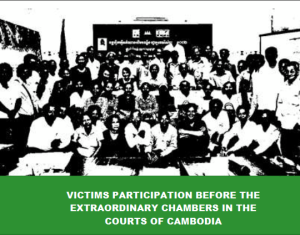
Phnom Penh, Cambodia, Victims’ participation is one of the unique features of the trials held by the Extraordinary Chambers in the Courts of Cambodia (ECCC), also known as the Khmer Rouge Tribunal (KRT). In November 2011, the ECCC Trial Chamber began its second trial, hearing evidence against three former top ranking Khmer Rouge leaders. Nearly 4,000 victims participate as Civil Parties in this second case (Case 002), over ten times more than in the first trial. This unprecedented large number of Civil Parties in an already complex trial poses challenges for the Court, lawyers and NGOs alike to achieve a balance between the rights of victims to an effective participation and the rights of the accused to a timely trial.
Considering this challenge and the limited resources available, ADHOC, the Cambodian Human Rights and Development Association (French Acronym), has established in 2010 a Civil Party Representative (CPR) scheme, to facilitate a two-way communication process between Civil Parties, their lawyers, and the Court. ADHOC acts as the intermediary organisation for nearly half of the Civil Parties admitted in Case 002, providing assistance for their participation in the ECCC’s legal proceedings. The CPR scheme is centred on the role of 122 Civil Party Representatives who act as the focal point and link between the majority of the Civil Parties assisted by ADHOC, their lawyers, ADHOC staff, and the Court.
This study constitutes a baseline analysis for the monitoring and evaluation of the CPR scheme implemented by ADHOC. Specifically, among Civil Parties assisted by ADHOC in Case 002, it aims to examine: (1) awareness, knowledge and attitudes of the ECCC; (2) their perceptions and expectations about justice; and (3) their expectations in regards to collective and moral reparations. It is anticipated that the findings will have broader lessons-learned to inform the participation of large numbers of victims in criminal trials in international and hybrid tribunals dealing with mass atrocities.
Download Baseline Study >>>
Access to legal knowledge granted through GIZ and CIM support
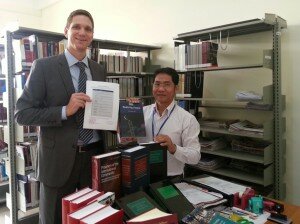
December 2012
Phnom Penh, Cambodia – Knowledge is key to the beholder. In Cambodia, access to knowledge is often weak and resources are limited, constraining professionals and researchers alike. Contemporary libraries are also hungry for resources to supply their readership demands.
In December 2012, GIZ in collaboration with CIM Legal Adviser to the Extraordinary Chambers in the Courts of Cambodia (ECCC), Mr. Simon Meisenberg organized a donation of legal textbooks on international criminal law. The donation totaled to over USD 3,000 in worth, was then handed over to the ECCC Library.
With access to resources, knowledge management also becomes a priority. To address this need, support was provided for a German expert and two Cambodian consultants to assist with the establishment of an on-site, open-source search engine in both English and Khmer languages. This work contributes to the Virtual Tribunal Project of the ECCC, an internet based open media library providing information about the work of the Tribunal.
The German Government’s support to the ECCC is long running and continues to provide financial contributions to the core tribunal budget. To date, more than USD 11 million has supported various projects of the ECCC.
